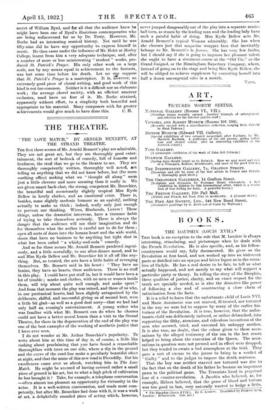THE THEATRE.
THE LOVE MATCH," BY ARNOLD BEMSETT, AT THE STRAND THEATRE.
THE first three scenes of Mr. Arnold Bennett's play are admirable. They are not great art, but they are thoroughly good enter- tainment, the sort of bedrock of comedy, full of humour and liveliness, the stuff that we go to the theatre to see. They are thoroughly competently written, thoroughly well acted, not telling us anything that we did not know before, but (far more soothing office) making what we " thought all along " seem just a little cleverer and more amusing than it really is. We are given smart back-chat, the strong, competent Mr. Bourchier, the beautiful and occasionally slightly tropical Miss Kyrle Bellew in lovely clothes, and an emotional crisis. There is, besides, some slightly sardonic humour as an aperitif, nothing
actually to make us think ; indeed, really only just enough to prevent our thinking. Wives, Husbands, Lovers ! These things, unless the dramatist intervene, have a tiresome habit of trying to take themselves seriously. There is always the danger that the audience will use their imagination and do for themselves what the author is careful not to do for them ; open all sorts of doors into the human heart and the wide world, doors that have no business to be anything but tight shut in what has been called " a whisky-and-soda " comedy.
And so for three scenes Mr. Arnold Bennett pandered ingeni- ously, and a little scornfully, to our after-dinner mood, and he and Miss Kyrie Bellew and Mr. Bourchier hit it all off like any- thing. But, so treated, the arts have a little habit of revenging themselves. Mr. Bennett said in his heart : " They have no brains, they have no hearts, these audiences. There is no stuff in this play. I could have put stuff in, but it would have been a lot of trouble ; masks and clothes, with no men or women inside them, will trip about quite well enough, and make sport." And from that moment the play was ruined, and those of us who, in our puritanical hearts, had been slightly antagonized by the deliberate, skilful, and successful giving us of second best, were a little bit glad—as well as a good deal sorry—that we had had only half an evening's entertainment. A young writer who was familiar with what Mr. Bennett can do when he chooses could not have a better moral lesson than a visit to the Strand Theatre, for there in the degeneration of the end of the play was one of the best examples of the working of aesthetic justice that I have ever seen.
I do not wonder at Mr. Arthur Bourchier's popularity. To
write about him at this time of day is, of course, a little like rushing about proclaiming that you have found a remarkable thoroughfare with trees on one side, where a dip in the ground and the curve of the road-line make a peculiarly beautiful effect at night, and that the name of this new road is Piccadilly. But his excellences came over us afresh, watching him in The Love Match. He might be accused of having covered rather a small piece of ground in his art, but to what a high pitch of cultivation he has brought it ! Take, for example, a. telephone conversation --often almost too pleasant an opportunity for virtuosity in the actor. It is a well-written conversation, and reads most com- petently, but after Mr. Bourchier had done with it, it was a work of art, a delightfully rounded piece of acting which, however, never jumped disagreeably out of the play into a separate music- hall turn, as stunts by the leading man and the leading lady have such a painful habit of doing. Miss Kyrle Bellew acts Mr. Arnold Bennett's typical Woman admirably. She has when she chooses just that magazine wrapper face that inevitably belongs to Mr. Bennett's la femme. She has very few faults, but I should say if she is going to improve her pleasant talent she ought to have a strenuous course at the "Old Vic." or the Grand Guignol, or the Birmingham Repertory Company, where, instead of going on to the stage and being Miss Kyrie Bellew, she will be obliged to achieve suppleness by contorting herself into half a dozen uncongenial roles in a month.
TARS,


































 Previous page
Previous page